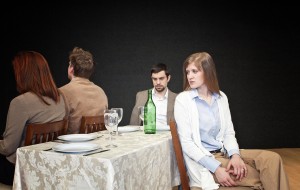Theatre of the Beat, founded in 2011, is a travelling theatre troupe that has gained a reputation for tackling tough topics. Its members create and perform intimate theatrical presentations across Canada, teach drama programs, and host coffee house discussions. Their aim is to foster awareness of important social issues as they travel around the country, with performances and lifestyles founded in the Beatitudes. The troupe consists of Rebecca Steiner, Kimberlee Walker, Benjamin Wert, Leah Harder Wideman and Artistic Director Johnny Wideman.
Forgiven/Forgotten is a thought-provoking play written by Johnny Wideman, which paints the story of a small church community thrown into turmoil upon hearing that an offender will be serving his parole in their midst. The troupe has been performing the play and hosting post-play discussions on their recent nationwide tour. Troupe member Benjamin Wert writes about the unexpected impact of one of their performances.

Forgiven/Forgotten, performed by Rebecca Steiner, Johnny Wideman, Kimberlee Walker and Benjamin Wert (left to right)
Performing on the Inside
I’ve traveled Canada a fair bit, both with the troupe and with others. I’ve always thought I had a good sense of the scope of the country and its “personality”. I know Canada, I thought – even more so, now that I’m a part of Theatre of the Beat. We stay in people’s homes, and take part in conversations with communities all across the country. It’s a privilege and a gift we don’t take for granted.
Recently a friend of mine told about her time living on a reservation in Northern Manitoba. The stories she told me struck deeply, and made me realize that I don’t know this country of mine nearly as well as I thought I did. I know a certain strata of Canada very well, but beyond that, and my knowledge and experience gets hazy very quickly.
A couple of weeks ago, we performed Forgiven/Forgotten in our first jail – the Winnipeg Remand Centre. We had to roll with the punches, as some of our props weren’t allowed into the Centre (A casserole dish? No way. A 2×4 with nuts and bolts sticking out? Go ahead!) The room was a bizarre polygonal shape that opened right into the airlock at the entrance, so we didn’t see any of the jail except the entrance and our performance space.
After setting everything up and doing a cue-to-cue rehearsal, we settled in our chairs and waited for the prisoners to be let in. There were fourteen men from two cellblocks. They entered one block at a time. The first group chatted with us as they sat, but quieted down when the men from the second block came in.
As we got up to begin our performance, some of the men were staring at the floor, some were looking expectantly at us, and some were leaning over and whispering to their neighbours. Two guards stood in the back corners of the room with crossed arms and tucked clipboards.
We performed the play. After performing a play dozens of times, you get a feel very early how the audience will respond. Are they laughers? Do they make audible gasps at strong emotional moments? Do they quietly mutter to each other when they notice subtle connections in the script? The Winnipeg Remand Centre audience was silent. No laughter. Almost no mutters. No gasps. But eyes on the floor became eyes on us, and by the time we took our bows, every man in the room was focused on us.
Because there were only fourteen men in the audience, I can close my eyes and remember each one during our discussion with them after the play. I remember the sad and bitter man who said the play portrayed his experience perfectly. I remember his quiet mumbling comments that I could barely understand, and the hard set of his body language. I remember the older man with grey hair and a big moustache. I remember his gratitude, his poetry when talking about the beauty of churches that welcomed him. I remember a quiet young man talking about being welcomed in a community because of his familiar last name, but being driven away by the gossip that bounced back and forth behind his back. I remember the indigenous man talking about the racism he felt in the church as soon as he walked inside. I remember the young guy in the front row who had a huge smile on his face as he told us that he’d never seen a play before. I remember the affirmation they gave of Johnny’s performance as Phil, the ex-con in the play, as they told him that he’d “got it”.
And then I remember them standing up and walking out a door. We walked out a different door. They went back to their cells, and we packed up and went outside to the parking lot.
Our image of the country we live in has expanded, and continues to expand with every community and prison we visit.
My Canada includes prisoners now. It includes people who’ve made mistakes; horrible mistakes that have consequences. But mistakes – criminal or otherwise – don’t stop us from being human, with everything that entails.
For more information about Theatre of the Beat, to check out their schedule or to book a performance, visit www.theatreofthebeat.com.
Forgiven/Forgotten rehearsal teaser:
Theatre of the Beat: Life on the Road








